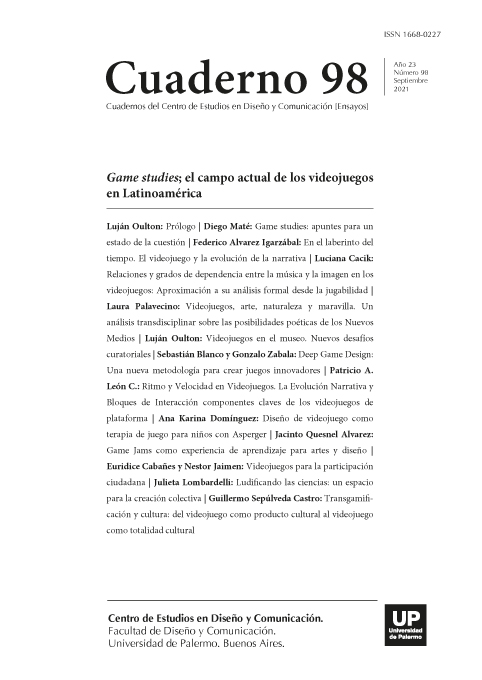Videojuegos para la participación ciudadana
Abstract
Video games have shown in recent years that, beyond being leisure products, they have other dimensions: cultural, artistic, aesthetic, pedagogical, etc. In the present article we approach a potential use of video games that has only just begun to be explored, but which promises to be very relevant in shaping citizenship, both physical and digital. That is, how video games can contribute to citizen participation in public policies. We will situate the video games within the tendency to the technological sovereignty, contributing practical examples that allow to understand better the possibilities of video games for the citizen participation.
References
Abercrombie, N., Hill, S., & Turner, B. S. (1994). The Penguin dictionary of sociology (3a ed.). London ; New York: Penguin.
Arsgames. (2017). Juegos de datos, soberanía tecnológica y videojuegos como bien común Un manifiesto político y programático para Juegos del Común. Recuperado de https://juegosdelcomun.arsgames.net/#manifiesto
Arsgames. (s. f.). CRAFTEA – Urbanismo y espacio público con videojuegos. Recuperado 30 de marzo de 2019, de https://craftea.arsgames.net/
Atkins, B., & Krzywinska, T. (Eds.). (2007). Videogame, player, text. Manchester: Manchester Univ. Press.
Benkler, Y. (2006). The wealth of networks: how social production transforms markets and freedom. New Haven London: Yale University Press.
Bittanti, M., Fraticelli, D., Gómez Cañete, D., & Lowood, H. (2008). L’homo videoludens: videojocs, textualitat i narrativa interactiva. Recuperado de http://books.google.com/books?id=ekg-AQAAIAAJ. Barcelona: Eumo Editorial
Bogost, I. (2010). Persuasive games: the expressive power of videogames (1. MIT Press paperback ed., [Nachdr.]). Cambridge, Mass.: MIT Press.
Carrubba, Luca. (2004). Ocupando el juego: el método artístico y la creación de juegos experimentales. Bit y aparte, 2. Madrid: Sello Arsgames. Ciudad de México. LEY DE PARTICIPACIÓN CIUDADANA DEL DISTRITO FEDERAL., (2004). Ciudad de México.
Consalvo, Mia, & Dutton, Nathan. (2006). Game analysis: Developing a methodological toolkit for the qualitative study of games. Game Studies, 6(1). Recuperado de http://gamestudies.org/0601/articles/consalvo_dutton
Escribano, Flavio. (2013). Gamificación versus Ludictadura. Obra Digital, 5. Barcelona: Universidad de Vic-Universidad Central de Cataluña y la Universidad del Azuay.
Frasca, Gonzalo. (Universidad de Sevilla). Juego, videojuego y creación de sentido. Una introducción. Videojuegos y Comunicación: hacia el lenguaje del videojuego, 7, 37-44.
Frasca, Gonzalo. (s. f.). Play the message. Play, Game and Videogame Rhetoric. Tesis Doctoral, IT University of Copenhagen. IT University of Copenhagen.
Fuchs, Christian. (2014). Retos para la democracia Medios sociales y esfera pública. Telos, Cuadernos de Comunicación e Innovación, 98, 71-98. Madrid: Fundación Telefónica.
García Bátiz, M. L., & Téllez Arana, L. (2018). El presupuesto participativo: un balance de su estudio y evolución en México. Perfiles Latinoamericanos, 26(52), 1-28. https://doi.org/10.18504/pl2652-012-2018
Glas, R., Lammes, S., Lange, M. de, Raessens, J., & Vries, I. de. (2019). The playful citizen: civic engagement in a mediatized culture. Recuperado de http://www.jstor.org/stable/10.2307/j.ctvcmxpds
Hartley, J. (2010). Silly citizenship. Critical Discourse Studies, 7(4), 233-248. https://doi.org/10.1080/17405904.2010.511826
Huizinga, J. H. (1980). Homo ludens. Madrid: Alianza Editorial.
Maietti, M. (2004). Semiotica dei videogiochi. Milano: Edizioni Unicopli.
Miller, V. (2011). Understanding digital culture. Los Angeles: SAGE.
Piaget, J. (1994). La formación del símbolo en el niño: imitación, juego y sueño: imagen y representación. México: Fondo de Cultura Económica.
Ramírez-Alujas, Álvaro. (2013). Hackear el Gobierno, reprogramar la Administración Pública y configurar una nueva infraestructura cívica. Presente y futuro del Gobierno Abierto. Revista Telos, Cuadernos de Comunicación e Innovación, 94, 84-88. Madrid: Fundación Telefónica.
Resina de la Fuente, Jorge. (2010). Ciberpolítica, redes sociales y nuevas movilizaciones en España: el impacto digital en los procesos de deliberación y participación ciudadana. Mediaciones Sociales. Revista de Ciencias Sociales y de la Comunicación, 7, 143-164. Universidad Complutense de Madrid.
Ryan, M.-L. (2001). Narrative as virtual reality: immersion and interactivity in literature and electronic media. En Parallax. Baltimore, Md.: Johns Hopkins Univ. Press. Savigny, Heather. (2002). Public Opinion, Political Communication and the Internet. Politics, 22(1), 1-8. University of Birmingham.
Sicart, M. (2009). The ethics of computer games. Cambridge, Mass.: MIT Press.
Torres Perez, F. (2009). Espacios públicos, sociabilidad y nuevos vecinos inmigrantes. Zainak. Cuadernos de Antropología–Etnografía, 32. España.
Tosca, S. P. (2003). The Quest Problem in Computer Games [Comunicación]. Darmstadt, Congreso Technologies for Interactive Storytelling and Entertainment. (2009). ¿Jugamos una de vampiros? De cómo cuentan historias los videojuegos. Comunicación, 7, 80-93. Universidad de Copenham.
Vygotski, L. S., Cole, M., & Luriia, A. R. (2016). El desarrollo de los procesos psicológicos superiores. Barcelona: Crítica.
Wallon, H. (1985). La evolución psicológica del niño. Buenos Aires: Psique.
Winnicott, D. W. (2013). Realidad y juego. Barcelona: Gedisa
Los autores/as que publiquen en esta revista ceden los derechos de autor y de publicación a "Cuadernos del Centro de Estudios de Diseño y Comunicación", Aceptando el registro de su trabajo bajo una licencia de atribución de Creative Commons, que permite a terceros utilizar lo publicado siempre que de el crédito pertinente a los autores y a esta revista.


